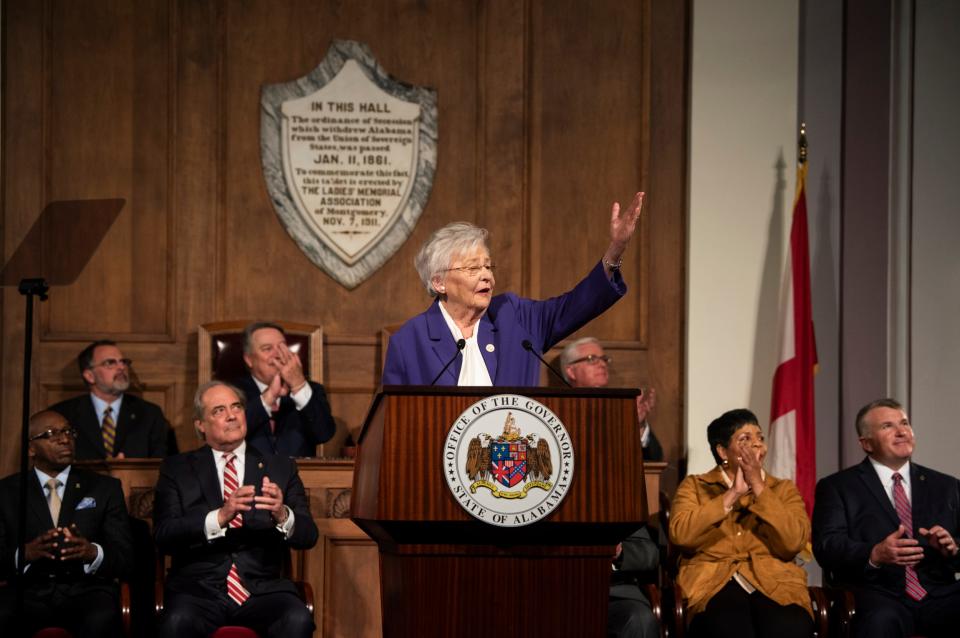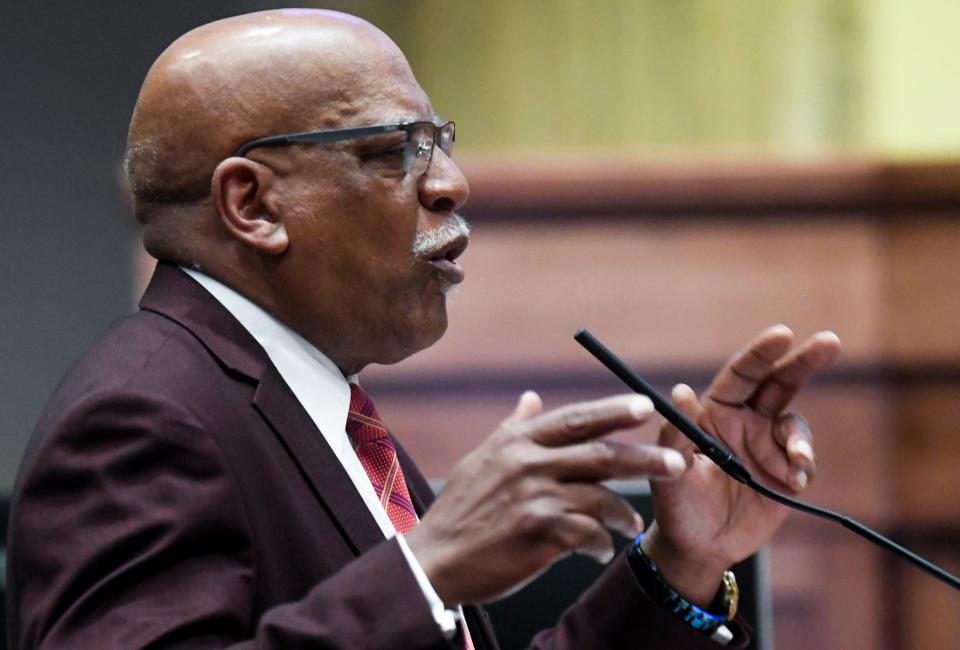Alabama legislature passes Ivey’s school choice bill, creating education savings accounts
- Oops!Something went wrong.Please try again later.
Gov. Kay Ivey maintained education as her top priority in Alabama for the last year, and on Wednesday evening, her $100 million school choice plan received its final approval from the state Senate, having already passed the House. Pending her official signature, the program will start in the 2025-26 school year.
Dubbed the CHOOSE Act, the legislation apportions up to up to $7,000 of state funding per student for families to spend on education-related expenses, like private school tuition, private tutoring and textbooks.
"Today, we've finally overcome the last hurdle in enacting Alabama's historic education savings account plan after the Alabama Senate strongly approved the CHOOSE Act. While our state has a strong public education system, all Alabama families will soon have the right to choose their children's schools," Ivey said in a statement Wednesday.
Ivey signed the bill into law Thursday morning.
The state legislature will be required to allot a minimum of $100 million each year to the CHOOSE Act Fund, and the accumulated balance of the fund is limited to $500 million. If the balance exceeds that amount, any surplus will go back into the Education Trust Fund.

The first 500 spots are reserved for students with special needs, like a 504 plan or an individualized education plan. Initially, the program will be limited to families making less than 300% of the federal poverty level, but the special needs reserved spots are not subject to income limitations.
Come 2027, the program will open up to families of all income levels.
While most state lawmakers, the governor and plenty of parents across the state support the program, public school advocates do not.
Ahead of Wednesday’s vote, Montgomery Public Schools Superintendent Melvin Brown called the education savings program a “money pit.”
“Public institutions should be supported by public funds. Private institutions should not, fundamentally, and what's happening now is a seething shift in the landscape to siphon public dollars into private entities,” Brown said. “I think it's also an effort to further segregate our schools, which is not humanistic. It's not what our society should be about.”
Groups like the Alabama Education Association have also pointed out concerns that kids who need education funding the most will not have access to the savings accounts since the income limits disappear after the first two years.
The school choice movement
As a concept, school choice allows families to use public funding to access alternatives to traditional public schools, like charters, private schools and online learning. The CHOOSE Act also allows participating homeschool parents to access up to $2,000 per student.
In recent years, a school choice movement has been building across the United States, particularly in Republican states, as parents look for ways to educate their children outside of public schools.
According to reporting from EducationWeek and the Education Writers Association, the COVID-19 pandemic helped the school choice movement pick up momentum, as pandemic learning exposed weaknesses in the public education system. Kids fell behind meeting grade-level benchmarks, parents disagreed with masking policies and everything in between.
“The CHOOSE Act will provide an opportunity for students to learn and thrive in an environment that best meets their needs, which could be a public school,” Rep. Danny Garrett, R-Trussville, said during a debate in February.
Garrett is the bill’s sponsor along with Sen. Arthur Orr, R-Decatur.
Alabama’s program is most similar to those in Arizona, Arkansas and Oklahoma.
A key point for lawmakers has been that parents will not directly receive the funds. Instead, the parent will be able to make “periodic payments” to a participating education service provider or participating school electronically.
“Many parents desire the opportunity to present their children with proven alternative methods of learning,” Ivey said during a visit to Montgomery’s private, Christian school Valiant Cross Academy earlier this year. “They must not be hindered in their determination to give that to their children.”
Legislators’ criticisms

Before the bill’s passage, there was a five-hour debate that included several amendments that did not pass.
Sen. Larry Stutts, R-Tuscumbia, proposed two amendments toward the end of the debate that were both tabled. He said he didn’t “appreciate getting run over like that.”
Sen. Rodger Smitherman, D-Birmingham, proposed an amendment to clarify that any money that is distributed for a special needs student must follow that student to whichever school they choose to attend, private or public. Ultimately, it failed.
“We’re wanting to look good to certain special interest groups who won't disappear, but the most important interest group is the kids, and we are not listening to them,” Smitherman said. “We are not showing that we're sensitive to what's happening to them, and we're not showing we care.”
Smitherman spoke for over an hour ahead of the vote about how he wanted to make the bill the best it could be for Alabama’s children.
Sen. Bobby Singleton, D-Greensboro, also criticized the “unintended consequences” of school choice.
“School choice is really not about having a choice to go somewhere,” Singleton said. “It's about having the money to go down to make the choice, and then there are limitations on that choice, depending on the school districts.”
He emphasized that the choice is determined by which students private schools want to accept.
Singleton proposed an amendment to specify that participating schools must be accredited. That amendment failed. He also proposed an amendment to require certified teachers in participating schools, and it also failed.
“Y’all just hate public schools,” he said. “We’re not giving our babies choices. We’re giving our babies fanfare.”
Hadley Hitson covers children's health, education and welfare for the Montgomery Advertiser. She can be reached at hhitson@gannett.com. To support her work, subscribe to the Advertiser.
This article originally appeared on Montgomery Advertiser: Alabama lawmakers pass school choice bill to create savings accounts

